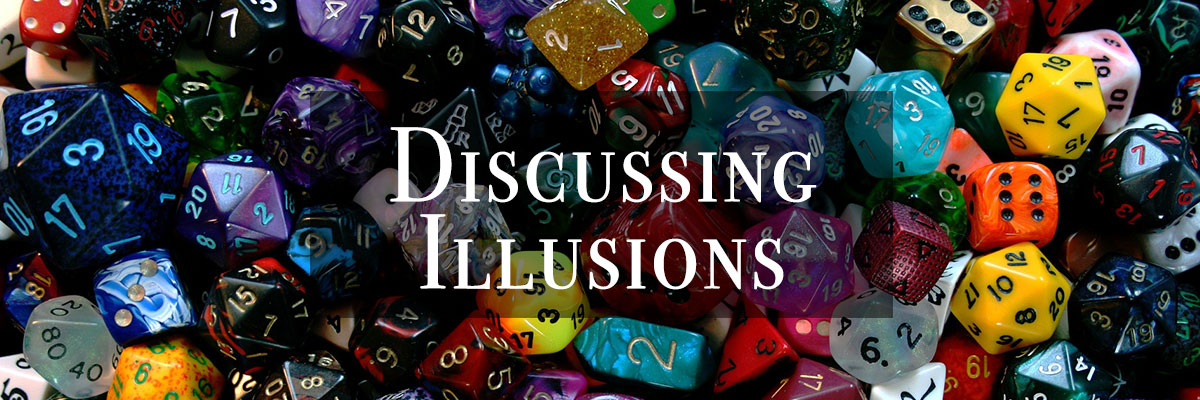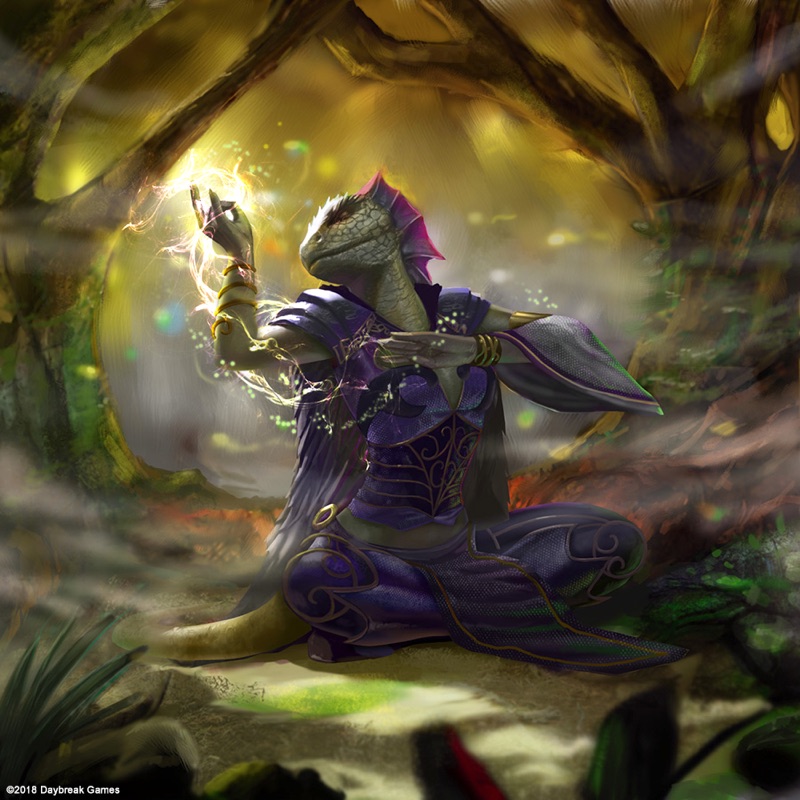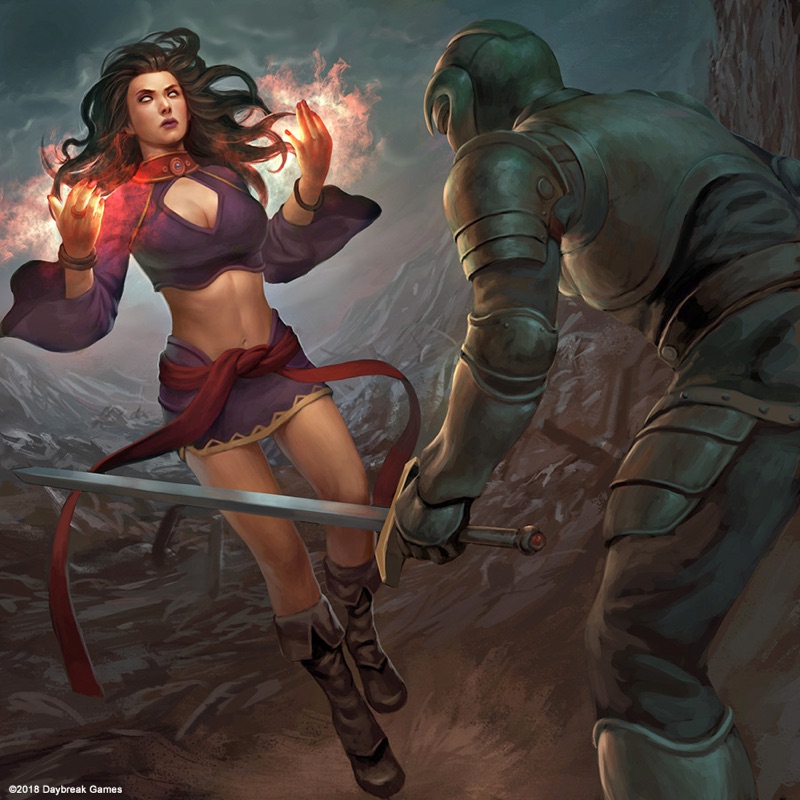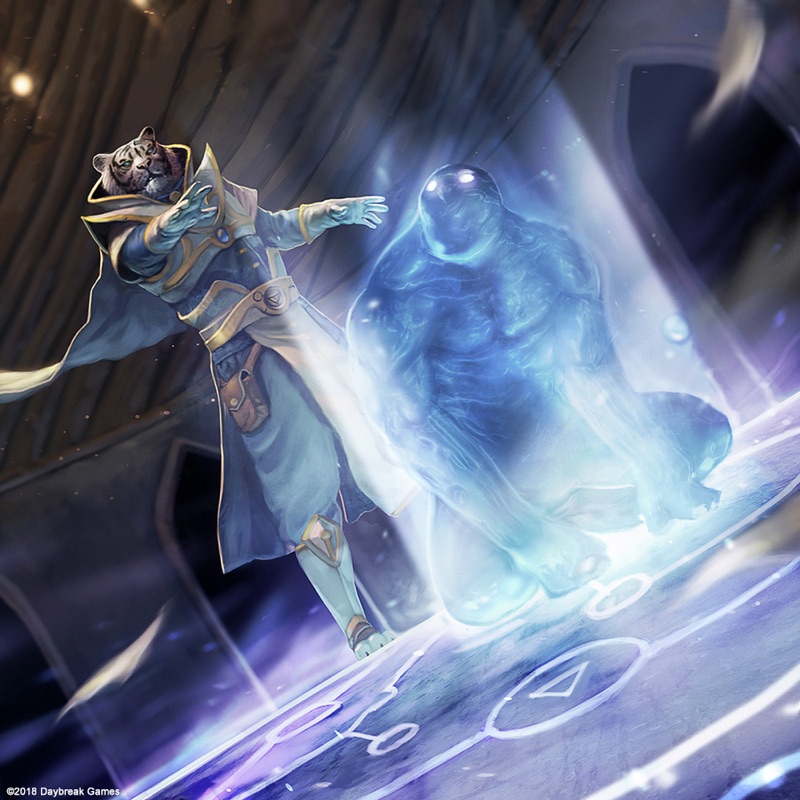At the Table: Discussing Illusions

Dungeons and Dragons is a game of imagination and shared experiences. In this wonderful world of collective creation, the players must suspend their beliefs to take part in shaping a world of magic and fantasy.

Rinaya Zishlin from Legends of Norrath
Creation through Imagination
There is a vast assortment of ways for a player to impact the world they are creating with their friends. Dungeons and Dragons is filled with mischievous and intriguing classes, many of them offer the player choices that revolve around different forms of magical spells and abilities that will allow their hero or villain to possibly change the outcome or a given situation. One of the more prominent ways that a player can actually change what another PC (player character) or NPC (non-player character) can see, touch, and hear, is through the use of illusion spells. Illusion spells allows the player to use their imagination to the fullest of their extent, to trick their friends and foes alike. The school of illusion is also one of the most difficult to navigate in game. It poses many challenges for the player and the dungeon master because of how detailed, completed, and confusing illusion spells can be.

The school of illusion is also one of the most difficult to navigate in game.
School of Illusion
The fifth edition Player’s Handbook states, “Illusion spells deceive the senses or minds of others. They cause people to see things that are not there, to miss things that are there, to hear phantom noises, or to remember things that never happened. Some illusions create phantom images that any creature can see, but the most insidious illusions plant an image directly in the mind of a creature.” The descriptor gives the reader a brief overview of the effects illusion spells can have on the creatures affected by the spell; however, it does not offer much advice on how to adjudicate or navigate the complexity some of the spells can create. Each illusion spell detailed in the Player’s Handbook tells the player how and what the spell can do. For example, the spell minor illusion allows the caster to create a sound or image of an object. Due to the limitations of this spell, your choices are limited and it makes the desired result an easy decision for both player and dungeon master. Once a player reaches higher levels, they can start casting spells such as, hallucinatory terrain, dream, and project image. Each of those examples becomes increasingly difficult to manage, depending on the situation.
Adjudication
The current version of dungeons and dragons is my favorite version, it gives the players and dungeon masters just enough rules to manage the properly without ruining the fun. For new dungeon masters and players, illusions can be tricky to handle for the reasons as stated above. The TSR Advanced D&D has multiple pages in the player’s handbook to help navigate the use of illusion spells. On page 108, under the section, illusions, it starts off by saying, “Of all spells, those of the illusion school cause the most problems. Not that they are more difficult for your player character to cast, but these spells are more difficult for you to role-play and for your DM to adjudicate. Illusions rely on the idea of believability, which in turn relies on the situation and the state of mind of the victim.” The difficulty about illusions is that your DM has to account for many factors.
First, you have to take into account the spell the player is using, and then how they wish to use it. Secondly, you have to consider, the situation; is it a role-play encounter, a combat encounter, what is the surrounding environment like, are there multiple NPCs reacting to this spell and situation. Third, if it is a combat scenario, is this new intrusion of magic on the battlefield so extreme that it pushes the boundaries of believability? These are only some of the plethora of situations that your characters can be in. Once the basics are answered, then the dungeon master has to move on to using the mechanics of the game to help determine the outcome of the illusion, which can and most likely will contribute to the success of failure of the spell. Some of these illusions can also take on substance to a certain degree, these are called phantasms, which if used in a creative way, can help push the success of a spell in the players favor.

Minion Mastery: Legends of Norrath
Behind the Screen
As a dungeon master I find illusion spells to be the most entertaining and difficult in the game, because I want the player to be successful, especially when the illusion is something fantastic! For example, if a player is creating an illusion of another creature they have seen before and want it to distract an NPC in a combat encounter; I tend to ask myself a few questions, does this NPC know what they are looking at? Have they experienced a creature like this before? Is this creature reacting in the manner it should? All of these questions fall under believability. I also tend to help myself gauge the situation based on the intelligence of the creature in their reaction to the spell. While this is built into the mechanics of the game with saving throws, I use it more for role-play purposes then actual mechanics.
In one of the latter paragraphs regarding illusions in the TSR Advanced Dungeons and Dragons player’s handbook there are more examples of believability. On page 109, there is one sentence that stands out the most to me as a DM and a player who loves illusions. It says, “At the same time, you must remember that a properly role-played character is familiar with the laws of his world.” Meaning, that if something looks out of place or breaks those laws they are used to experiencing, then it will raise suspicion and cast doubt on the spell being used.
DM Tips
When it comes to adjudicating illusion spells, try to avoid handing your players a victory just to make them happy. That robs them of a true victory. It makes the win cheap and meaningless. If the spell fails because the NPC sees through their illusion, let that be the outcome. However, if the character creates a devilishly masterful illusion and wins the party the day, enjoy that moment with them. Remember, a victory shrouded in illusory magic can be enchanting!

Daniel Colby
Dungeon Master by day, mad illusionist by night!
Daniel Colby has just recently entered into the realm of freelance writing. He has a couple of article series’ on the Kobold Press website along with some self published adventures on the DMs Guild.
2 Comments
Leave a Reply
At the Table: Discussing Illusions

Dungeons and Dragons is a game of imagination and shared experiences. In this wonderful world of collective creation, the players must suspend their beliefs to take part in shaping a world of magic and fantasy.

Rinaya Zishlin from Legends of Norrath
Creation through Imagination
There is a vast assortment of ways for a player to impact the world they are creating with their friends. Dungeons and Dragons is filled with mischievous and intriguing classes, many of them offer the player choices that revolve around different forms of magical spells and abilities that will allow their hero or villain to possibly change the outcome or a given situation. One of the more prominent ways that a player can actually change what another PC (player character) or NPC (non-player character) can see, touch, and hear, is through the use of illusion spells. Illusion spells allows the player to use their imagination to the fullest of their extent, to trick their friends and foes alike. The school of illusion is also one of the most difficult to navigate in game. It poses many challenges for the player and the dungeon master because of how detailed, completed, and confusing illusion spells can be.

The school of illusion is also one of the most difficult to navigate in game.
School of Illusion
The fifth edition Player’s Handbook states, “Illusion spells deceive the senses or minds of others. They cause people to see things that are not there, to miss things that are there, to hear phantom noises, or to remember things that never happened. Some illusions create phantom images that any creature can see, but the most insidious illusions plant an image directly in the mind of a creature.” The descriptor gives the reader a brief overview of the effects illusion spells can have on the creatures affected by the spell; however, it does not offer much advice on how to adjudicate or navigate the complexity some of the spells can create. Each illusion spell detailed in the Player’s Handbook tells the player how and what the spell can do. For example, the spell minor illusion allows the caster to create a sound or image of an object. Due to the limitations of this spell, your choices are limited and it makes the desired result an easy decision for both player and dungeon master. Once a player reaches higher levels, they can start casting spells such as, hallucinatory terrain, dream, and project image. Each of those examples becomes increasingly difficult to manage, depending on the situation.
Adjudication
The current version of dungeons and dragons is my favorite version, it gives the players and dungeon masters just enough rules to manage the properly without ruining the fun. For new dungeon masters and players, illusions can be tricky to handle for the reasons as stated above. The TSR Advanced D&D has multiple pages in the player’s handbook to help navigate the use of illusion spells. On page 108, under the section, illusions, it starts off by saying, “Of all spells, those of the illusion school cause the most problems. Not that they are more difficult for your player character to cast, but these spells are more difficult for you to role-play and for your DM to adjudicate. Illusions rely on the idea of believability, which in turn relies on the situation and the state of mind of the victim.” The difficulty about illusions is that your DM has to account for many factors.
First, you have to take into account the spell the player is using, and then how they wish to use it. Secondly, you have to consider, the situation; is it a role-play encounter, a combat encounter, what is the surrounding environment like, are there multiple NPCs reacting to this spell and situation. Third, if it is a combat scenario, is this new intrusion of magic on the battlefield so extreme that it pushes the boundaries of believability? These are only some of the plethora of situations that your characters can be in. Once the basics are answered, then the dungeon master has to move on to using the mechanics of the game to help determine the outcome of the illusion, which can and most likely will contribute to the success of failure of the spell. Some of these illusions can also take on substance to a certain degree, these are called phantasms, which if used in a creative way, can help push the success of a spell in the players favor.

Minion Mastery: Legends of Norrath
Behind the Screen
As a dungeon master I find illusion spells to be the most entertaining and difficult in the game, because I want the player to be successful, especially when the illusion is something fantastic! For example, if a player is creating an illusion of another creature they have seen before and want it to distract an NPC in a combat encounter; I tend to ask myself a few questions, does this NPC know what they are looking at? Have they experienced a creature like this before? Is this creature reacting in the manner it should? All of these questions fall under believability. I also tend to help myself gauge the situation based on the intelligence of the creature in their reaction to the spell. While this is built into the mechanics of the game with saving throws, I use it more for role-play purposes then actual mechanics.
In one of the latter paragraphs regarding illusions in the TSR Advanced Dungeons and Dragons player’s handbook there are more examples of believability. On page 109, there is one sentence that stands out the most to me as a DM and a player who loves illusions. It says, “At the same time, you must remember that a properly role-played character is familiar with the laws of his world.” Meaning, that if something looks out of place or breaks those laws they are used to experiencing, then it will raise suspicion and cast doubt on the spell being used.
DM Tips
When it comes to adjudicating illusion spells, try to avoid handing your players a victory just to make them happy. That robs them of a true victory. It makes the win cheap and meaningless. If the spell fails because the NPC sees through their illusion, let that be the outcome. However, if the character creates a devilishly masterful illusion and wins the party the day, enjoy that moment with them. Remember, a victory shrouded in illusory magic can be enchanting!

Daniel Colby
Dungeon Master by day, mad illusionist by night
Daniel Colby has just recently entered into the realm of freelance writing. He has a couple of article series’ on the Kobold Press website along with some self published adventures on the DMs Guild.
2 Comments
-
James Lawrence Colby Jr. on July 4, 2018 at 4:16 am
Great artical Dan, it has been fifteen years since I have had a chance to ait diwn with a good DM. I been keeping trck for a while on your stuff keep up the good work.
-
Daniel Colby on July 22, 2018 at 2:09 pm
Thank you very much!
-

Great artical Dan, it has been fifteen years since I have had a chance to ait diwn with a good DM. I been keeping trck for a while on your stuff keep up the good work.
Thank you very much!